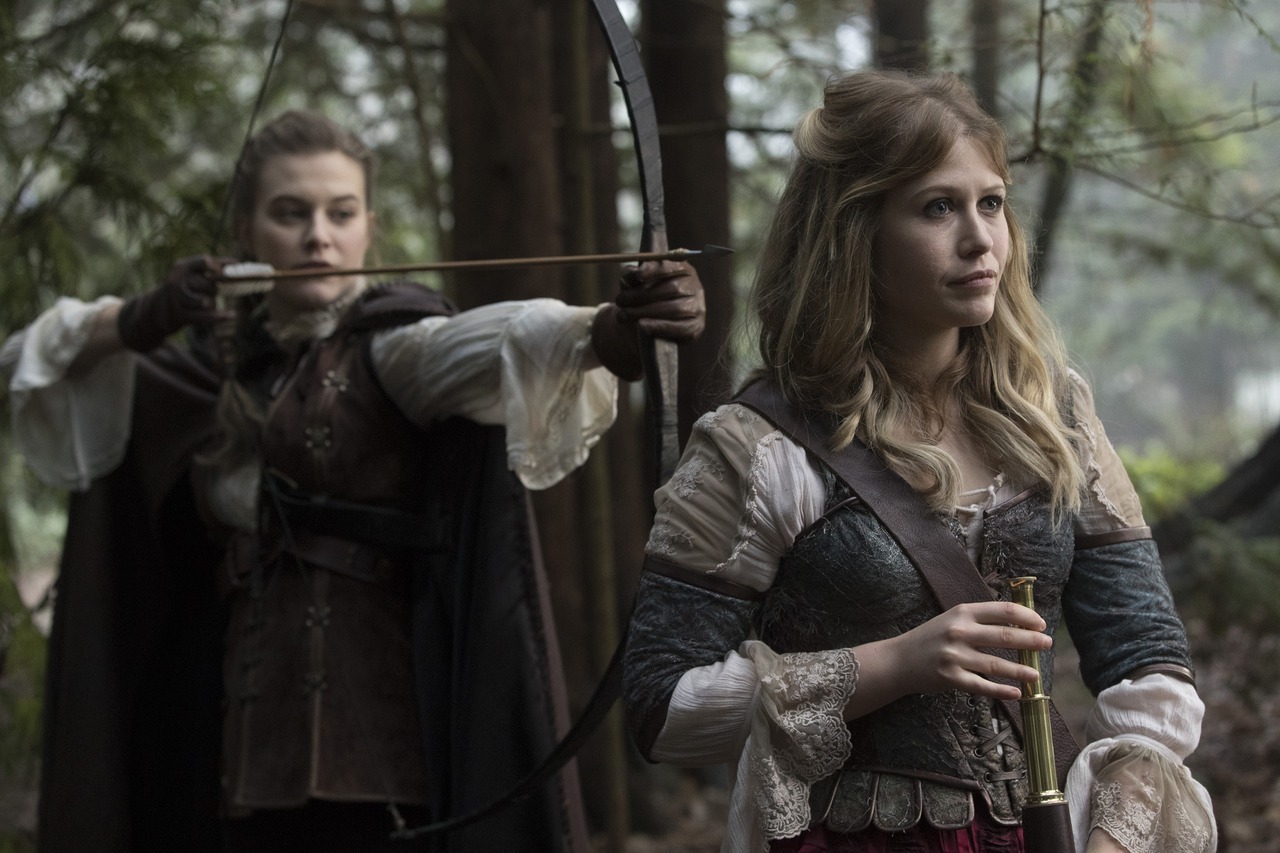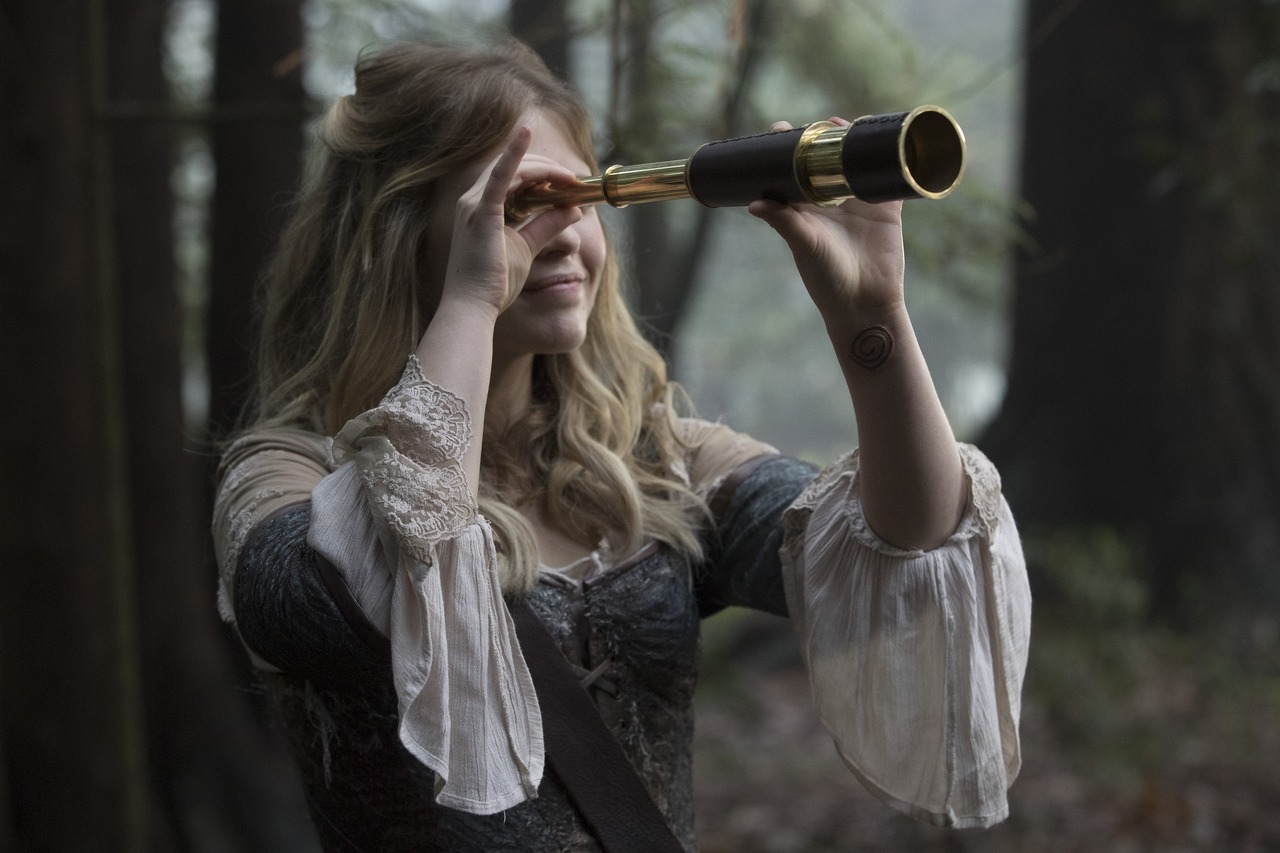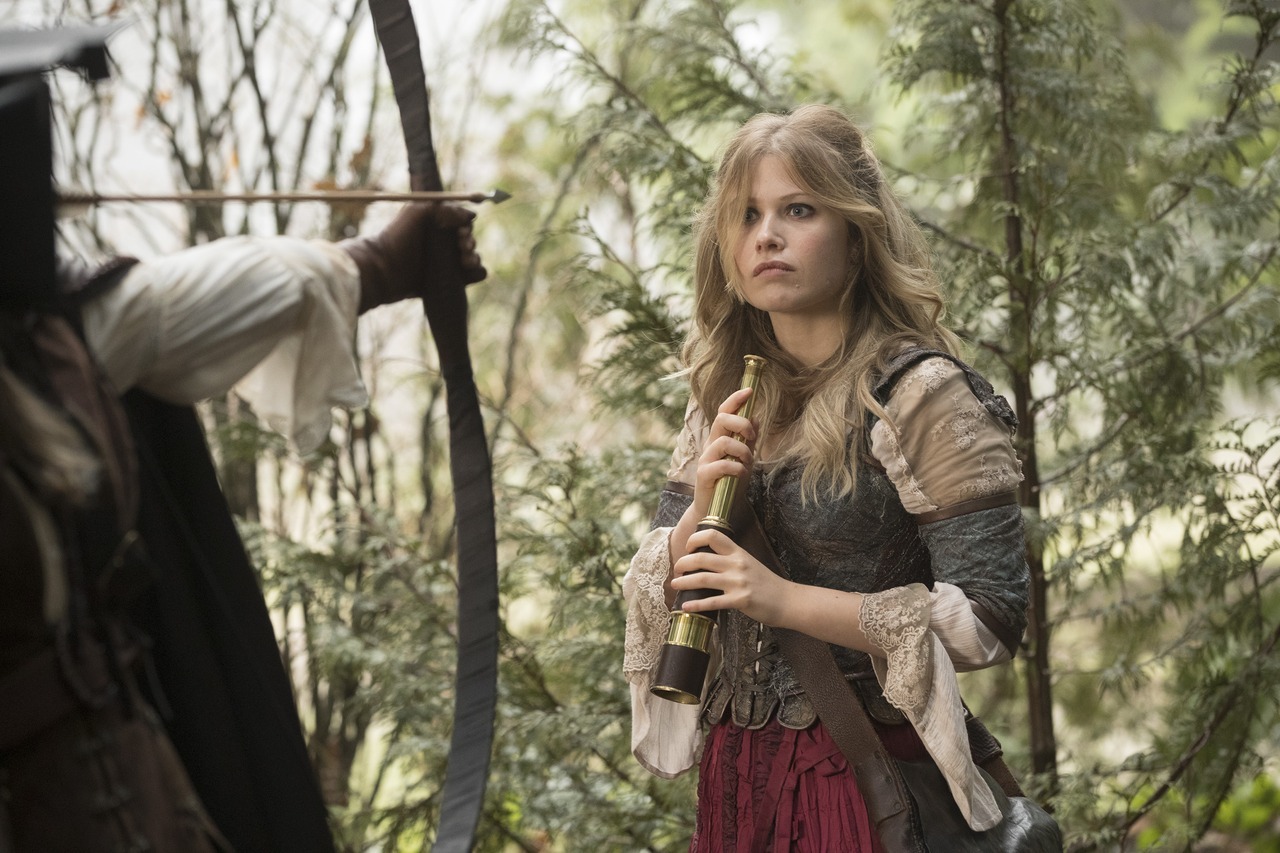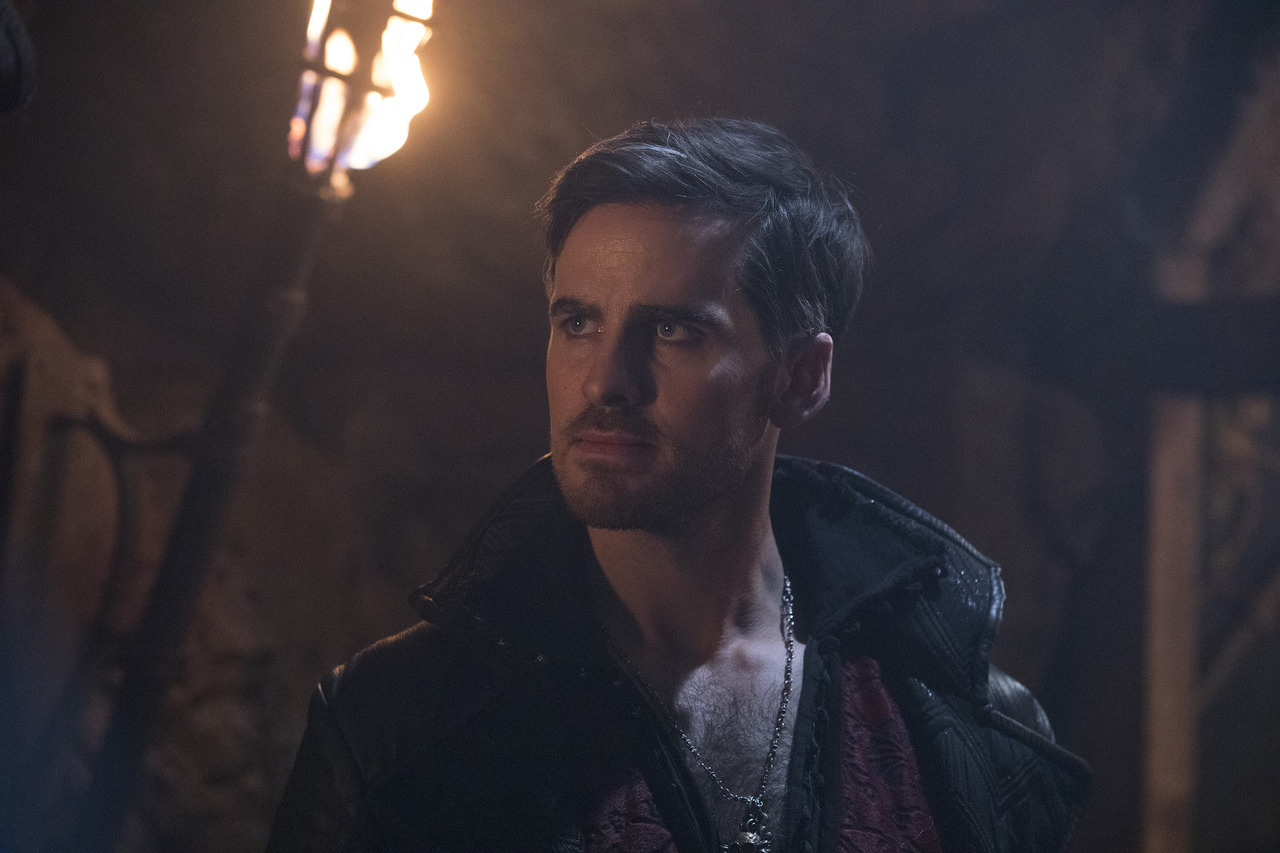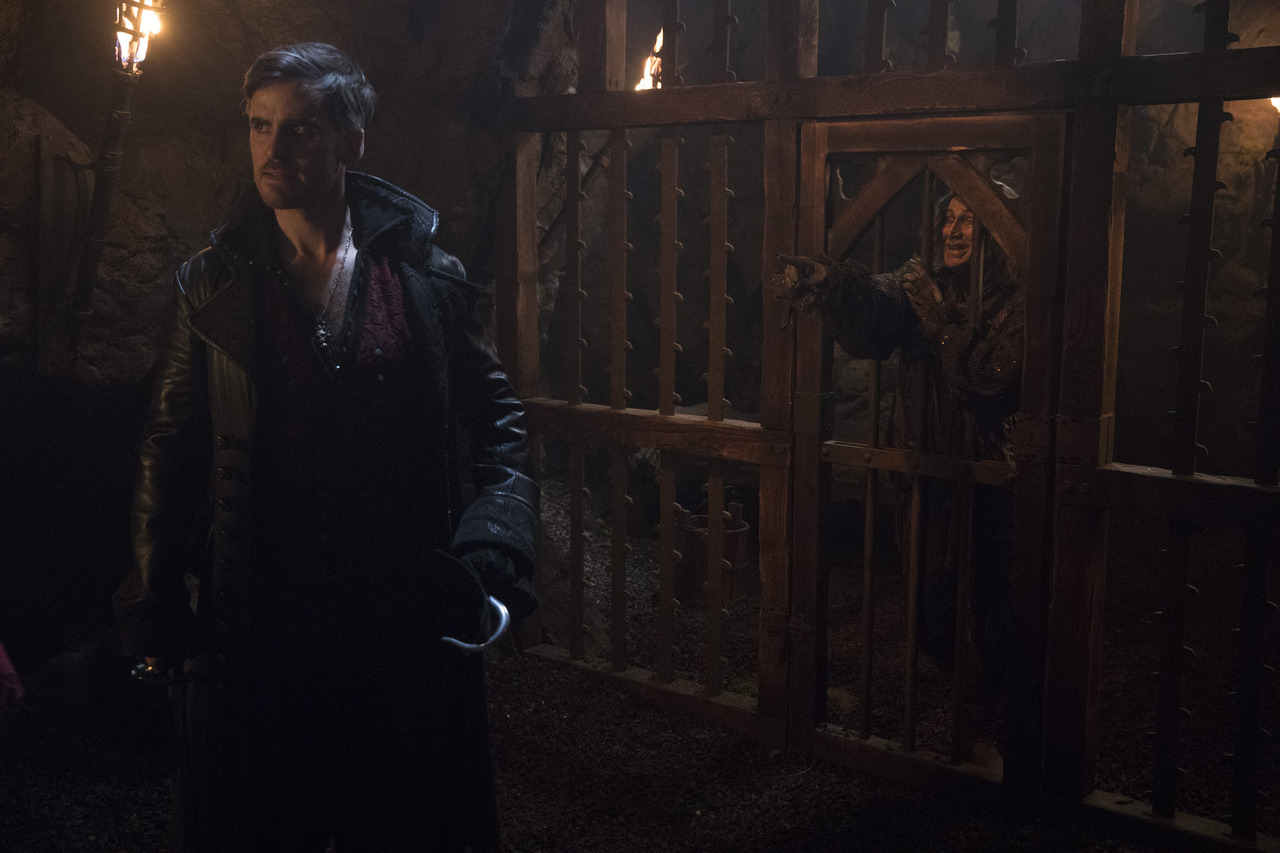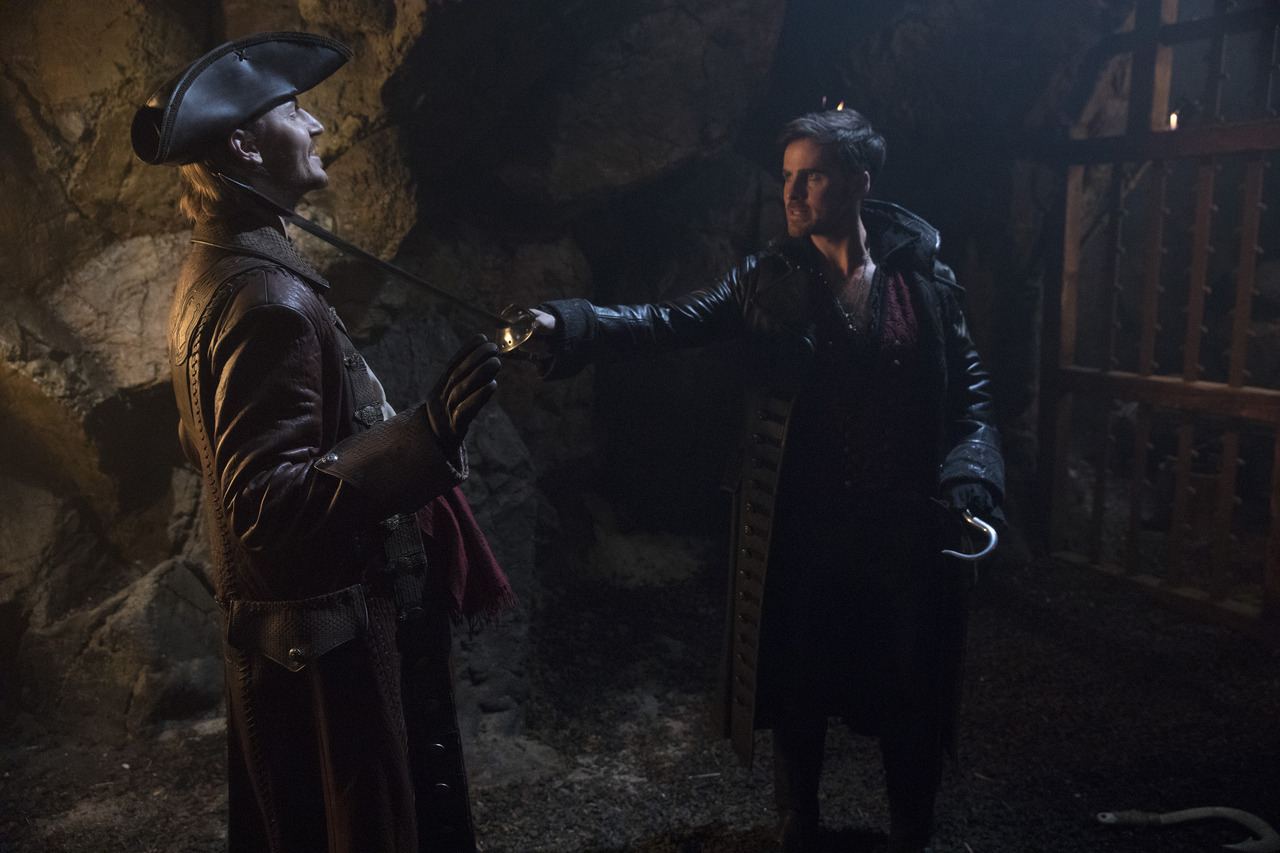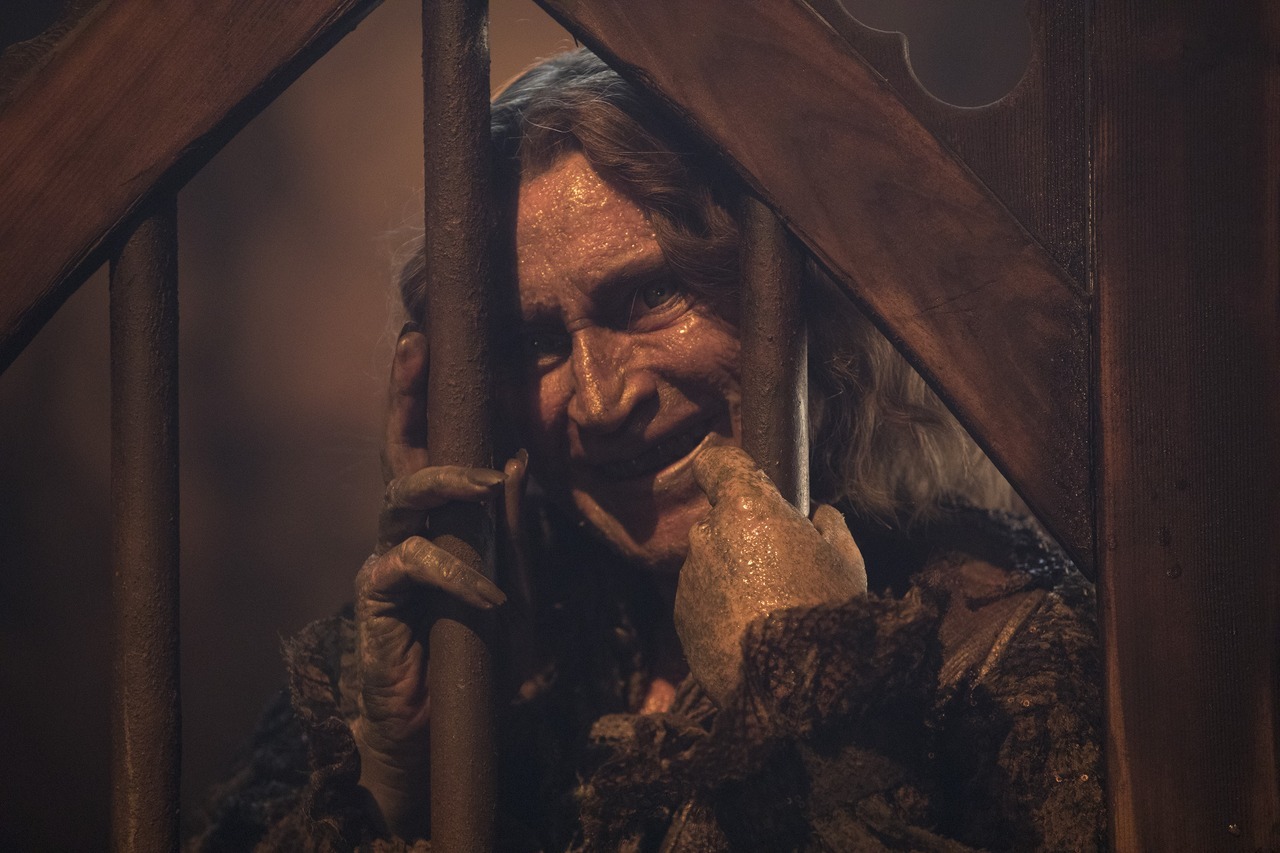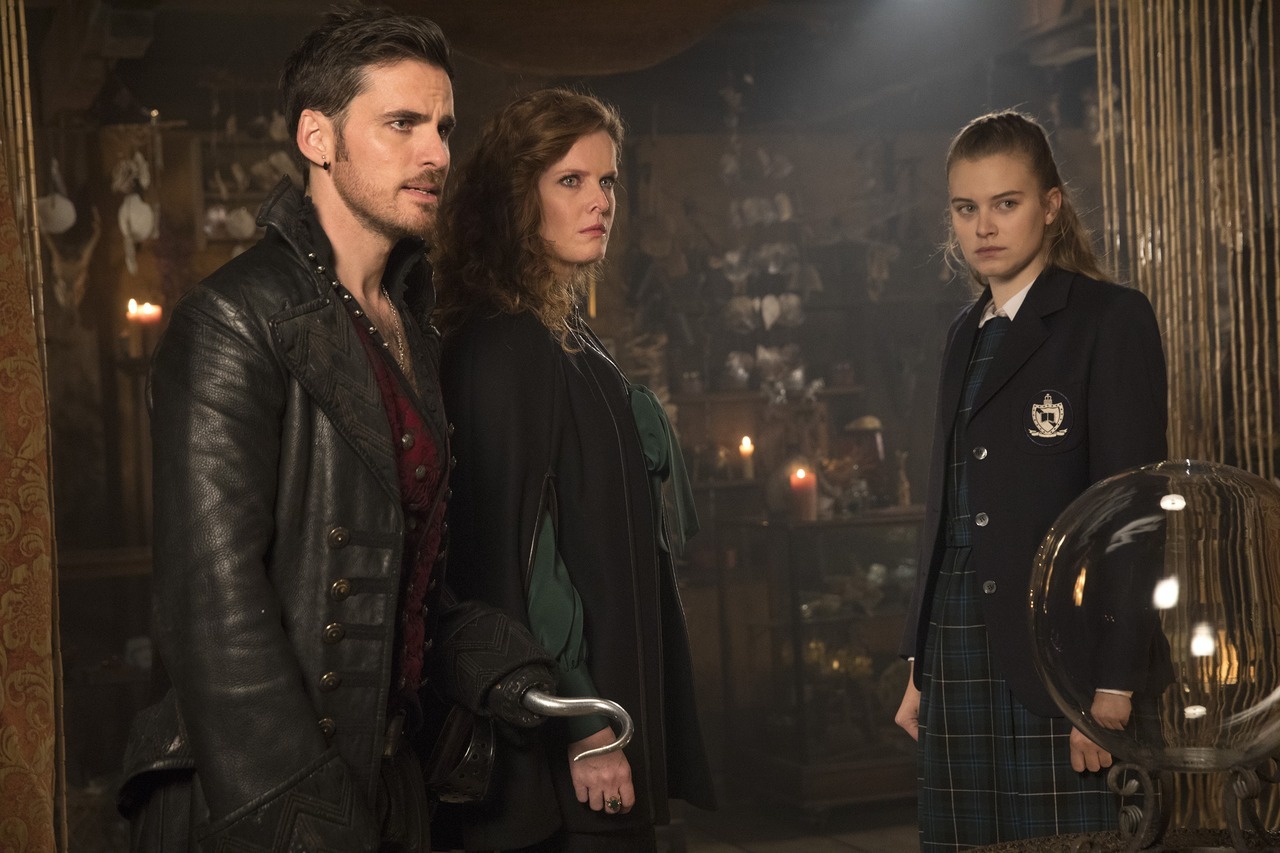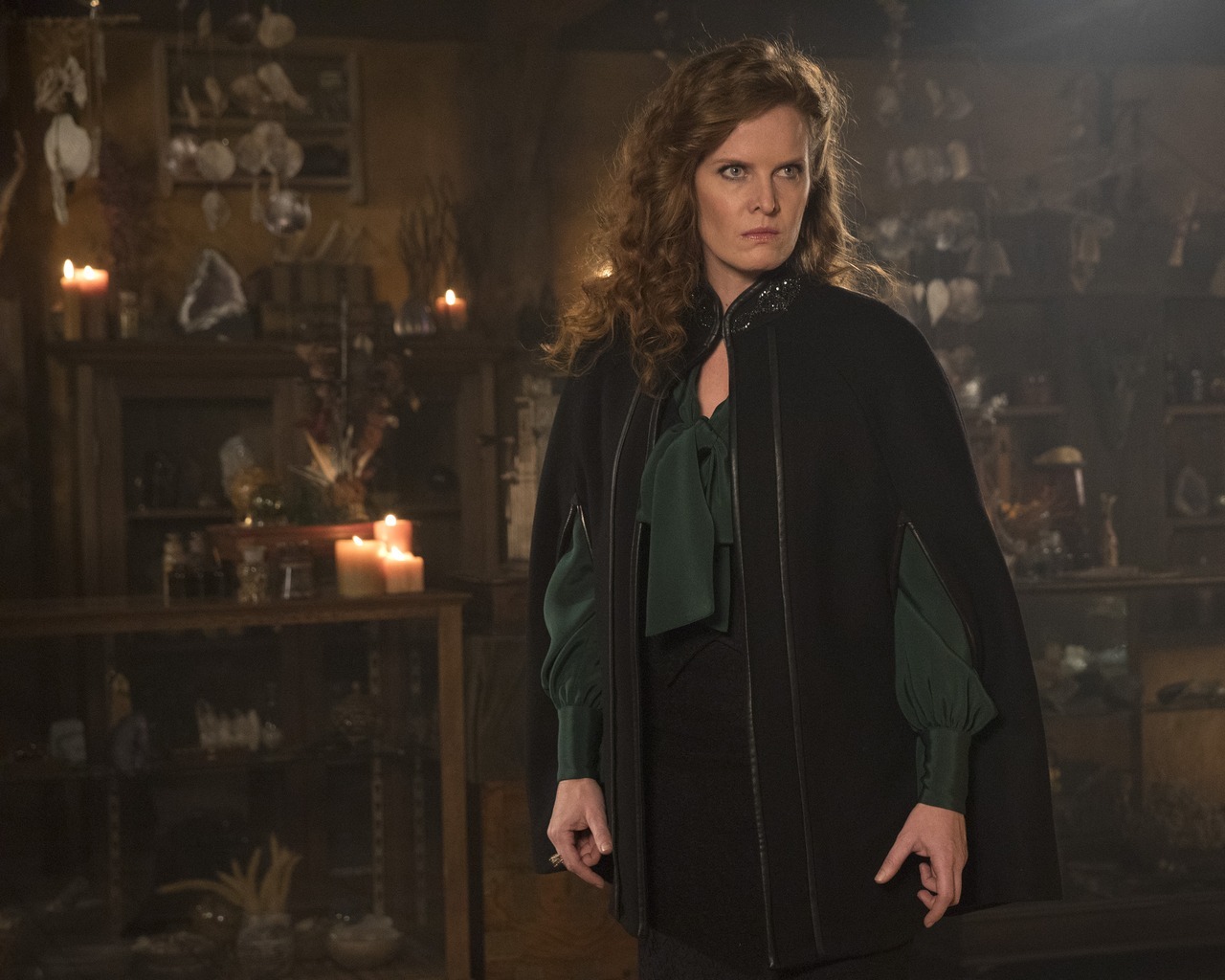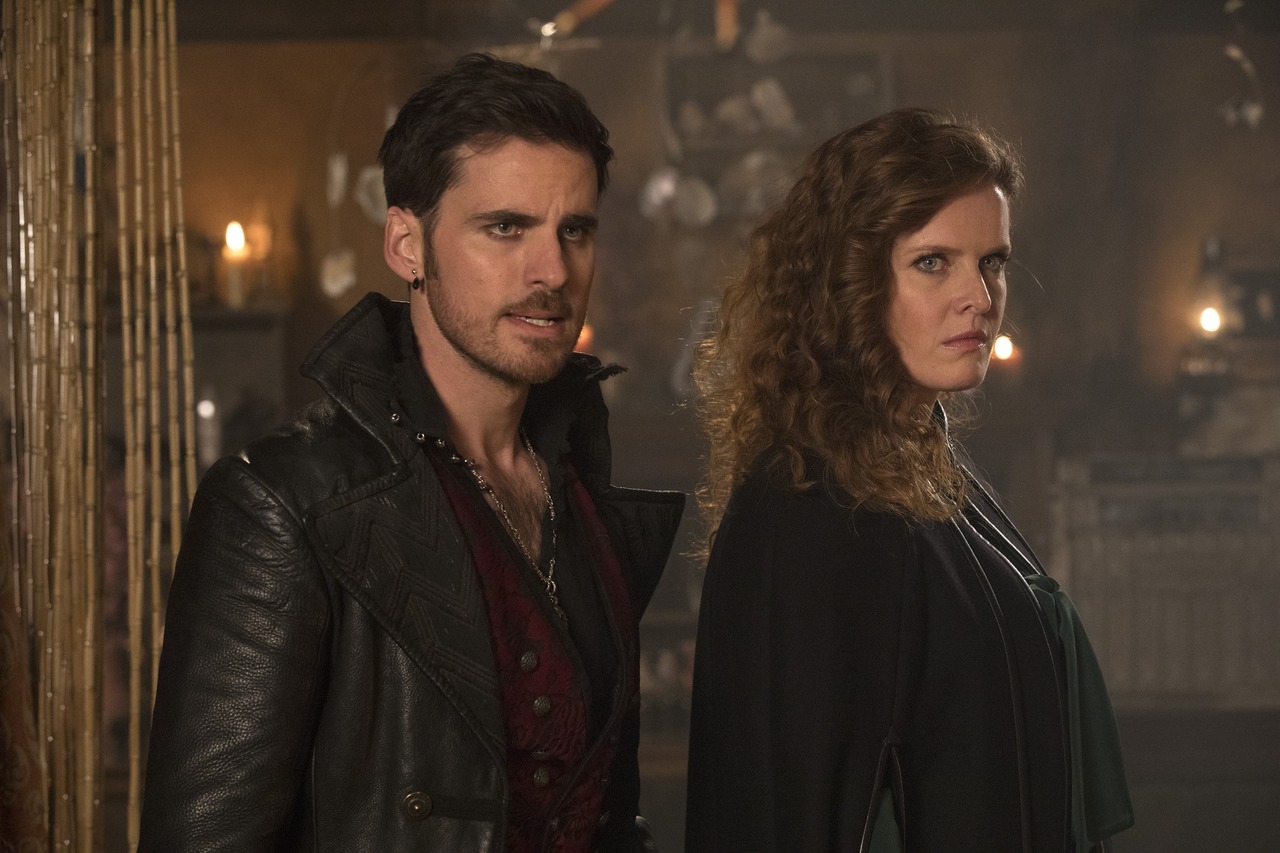Who else remembers the episode "Ruby Slippers"? Or, more accurately, who else remembers how awful the episode "Ruby Slippers" was? The season five episode was OUAT's first foray into an LGBTQ romance after much criticism from both fans and reviewers about the lack of diversity in the show's depiction of love. Little Red Riding Hood and Dorothy of Oz met, had a few conversations, had true love's kiss and then were promptly shipped off to Forgotten Character Island where they were never heard from again. All in all, not a stellar example of a nuanced, careful and considerate love story--LGBTQ or not. I admit to some trepidation with this week's episode "The Girl in the Tower" because I feared that Alice and Robin's love story would follow the same mold: meet cute, one conversation to establish a connection, some sort of proof of true love, and then wham bam thank you ma'am, love story established and summarily dealt with. It turns out the writes might have learned some lessons from the Ruby/Dorothy debacle, put on the proverbial breaks, and eased into a Robin and Alice love story with far more class and consideration than before. Sometimes, these writers can still surprise me.
Impossible Things
Alice and Robin work together as future lovers for a few different reasons. First and foremost, each character was established as their own person in their own right before ever meeting each other. Though Robin's introduction has been briefer than Alice's, her broad strokes are defined in such a way that we understand her. And in case the audience is really dense, the writers have Robin deliver her own characteristics in exposition (because while the writers can still surprise me, they are--at the end of the day--still OUAT writers). Robin was a classic mean girl but hiding behind her own loneliness and sense of not belonging. Robin collected 'friends' to make her feel better and wanted to escape the confines of Storybrooke, badly. It's more or less typical teenage ennui but at least it feels real. Robin's characterization comes from a relatability that most of us can identify with because it isn't couched in wild fairy tale magic. What teenager doesn't dream of escaping their parents and finding their own life story beyond the walls of their town? This need for freedom and to step outside the norm has been a running through line of this entire season. Henry left Storybrooke for the same reason; Zelena and Robin move to a completely different universe to start over. The show, as a whole, uprooted itself, left its own protective home and tried to find a new story in a new setting. Alice is going through much the same thing; she finally managed to climb out of that tower (er, wished herself a giant to lift her out) and set off and see the world. She has the same ennui as Robin which ties them together, the only difference being that Alice's ennui definitely comes from magic but, if truth be told, I'm more forgiving of this with Alice because her character has been built up slowly since the beginning of the season. Alice is a little bit mad, a little bit unhinged, and a little bit weird, but wouldn't you be if you spent the first seventeen or so years of your life trapped in a single room tower? Where Alice and Robin also work is in what they gain from each other. Alice needs Robin's steady hand and reasoning skills. Alice goes a mile a minute and often gets so caught up in her special form of crazy that she needs someone who can fire an arrow perfectly from a hundred yards away. When Alice is spiraling and thinking herself too mad, Robin is there to pull her back. In reverse, Alice shows Robin what true friendship is, not only between the two of them but also between Alice and her troll/giant friend. Robin has never had any real friends, only the illusion of them. Alice is Robin's first real friend and to have your first real friend at such an old age is both sad and wonderful. All of this works really well to endear the audience to this new pair, but I think where it succeeds the most is that this episode does not, in any way, confirm true love between Alice and Robin. In fact, I think it deliberately goes out of its way to make sure that Alice and Robin end this flashback episode as friends, not lovers. That, more than anything else, is smart. We've been letdown with Henry and Ella; a necklace declared them to be true love, they were married offscreen, and suddenly had a baby, instead of letting a relationship develop organically. It didn't even feel like they were true friends first. But with Alice and Robin we get more development, more time together to see them as friends before they invariably have some sort of true love's kiss or moment. It's nice to be reminded that lovers should always start out as friends and that love takes time; it's not something that is born overnight in the span of a single day and adventure.
Miscellaneous Notes on The Girl in the Tower
--For this particular version of Alice, Hatter is a literal hat and Alice is talking to him. This is both hysterical and not at all surprising.
--“Turns out… I have more than one hair pin!” I love how proud Alice is of that fact and not that she managed to pick a lock.
--Having Emma work with Henry to spy on Regina back in season 1 was okay because in the end Regina would never hurt Henry; however Mr. Samdi doesn’t have the same consideration for Lucy so Regina recruiting her granddaughter to spy on him seems….reckless.
--I need to not find Ivy and Henry compelling because we all know Jacidna/Henry are endgame in spite of the lack of chemistry. But I really did like Ivy apologizing to Henry for everything that Cursed!Henry doesn’t know about yet.
--Alice can wish things into existence. That pretty much points to her being the Guardian, yes?
--I find nothing compelling nor interesting about Regina and Facilier and the reveal of his big plan was more groan worthy than interesting. Shocking…someone wants the Dark One dagger!
Saturday, March 24, 2018
Saturday, March 17, 2018
In Which I Review Once Upon a Time (7x13)
If we go by my supposition last week then light, inoffensive entertainment is what we're seeking as we move closer to the series finale of Once Upon a Time. And, without any sort of preamble or caveat, this week's episode "Knightfall" delivered just that. Frothy with just a touch of sweetness that goes down smooth; memorable in that it stands out as the best episode of the three aired so far in this back half, but not so incredible as to become an instant classic or topple the likes of "Manhattan" or "Skin Deep." This episode touches on character traits that make sense--even if Hook is now Nook--which is something I do not often get to applaud with OUAT--and moves the story along at an even pace, setting up more mystery and questions that don't exactly stir me in the way the show used to but do at least keep me thinking and waiting to see what comes next. Light, frothy, and only nine to go....
White Whales
It turns out, much to my surprise and maybe delight, that I have some fairly complicated feelings about Not!Hook (or Nook as I've decided to call him from now on, thanks Zelena). Can you remember back to season two when Hook was introduced? I wasn't impressed, at all. I found him smarmy, gross, and after he left Emma and the princess team of Snow, Mulan and Aurora to die in jail, I was thoroughly done with him. Long time readers will not be surprised that I have a particular dislike for the pirate; I've certainly made no secret of it. But I will confess that the only time I have found Hook interesting or thought that the show was offering up something new and fresh was in the season two finale in which we learned that Hook had been a sort of mentor and father figure to young Baelfire. To our original Hook, Bae was like a son, someone he loved for, cared for, and would have raised in place of Rumple had things not gone sideways. After those two final episodes, it seemed to me that Hook's real story was not just as a smarmy, leather clad Jack Sparrow wannabe, but instead he was another sort of "Wicked Witch." A villain who had an obsessive need to kill another character but found the relationship complicated by way of an offspring. It was hard for Regina to justify killing Snow White when her complicated friendship with Emma and mother-son bond with Henry stood in the way. Baelfire might be Rumple's son but he was also Hook's adopted/step son. Just as the dynamic team of Emma and Henry would bring Snow and Regina back together, so too would Bae bridge the divide between Rumple and Hook. Alas, that did not happen and Rumple and Hook spent most of their time from season three to season six at each others throats, always trying to out do, one up, or just generally harass the other. But, enter season seven in which Hook, the original pirate captain, is replaced by Wish Realm Hook, our Nook. Suddenly the trappings of romance that the audience sat through (read: suffered through) with Emma was no more; instead, the writers needed a way to make Nook palatable to both Hook lovers and Hook haters.
Enter Alice. It's a smart move because it realigns Nook back to his original story of a father trying to make amends to a child (and notice the neat irony in that this time around, it's Rumple who semi-adopted the child in question). It helps give the Hook lovers a new story to follow of their favorite character and it gives Hook haters a break from the never ending romance of Captain Swan and allows Colin O'Donnaghue to play Hook as something other than a love sick puppy. With Nook being taken back to square one, it's also a good time to dig into Nook/Hook's original character flaw, his harmatia, namely his obsessive tendencies to kill the Dark One and to demand satisfaction for his honor. The dual with Captain Ahab was a reminder that when it comes to letting go of pride and insults, Nook had a long way to go, daughter or no. This isn't exactly character building but more character reminding; the audience knows this about Nook because they knew it about Hook. This story is a nice way to remind the audience of that which they already knew while giving new details to Nook's story since it differed to Hook's in the Alice-regard. Sometimes you do not have to say anything brand new for the message to come across; just as Hook missed out on a chance to raise Baelfire because he could not give up his obsession with killing Rumple, so too did Nook miss out on freeing Alice because he would not let a slight about his pirating ways go unanswered. Parallels, this show does love them so.
Miscellaneous Notes on Knightfall
--Pitting Nook and Ahab against each other was smart; both our fictional Nook and the literary Ahab have a tendency to get obsessive over their “white whales”.
--I simply adore Alice. It's the sign of good writing and good acting when this show can make me wish that a character had shown up in the history of the narrative much earlier.
--As we get closer to the finale, I've begun to make notes of things that I will genuinely miss; first up--Bobby Carlyle's remarkable and entertaining performance as Dark One Rumplestiltskin.
--So Nook lived in the tower without going out and being a pirate for like 10 year but never once did he buy himself some non pirate clothing? Also, how did he have money if he wasn't working or looting as pirates are wont to do?
--Jacinda and Henry have so little chemistry that I actually found myself drawn more to Henry and Ivy and their connection.
–The doll, Beatrice, is creeeeeeepy.
–“Read it? I lived it.” A surprisingly emotional line.
White Whales
It turns out, much to my surprise and maybe delight, that I have some fairly complicated feelings about Not!Hook (or Nook as I've decided to call him from now on, thanks Zelena). Can you remember back to season two when Hook was introduced? I wasn't impressed, at all. I found him smarmy, gross, and after he left Emma and the princess team of Snow, Mulan and Aurora to die in jail, I was thoroughly done with him. Long time readers will not be surprised that I have a particular dislike for the pirate; I've certainly made no secret of it. But I will confess that the only time I have found Hook interesting or thought that the show was offering up something new and fresh was in the season two finale in which we learned that Hook had been a sort of mentor and father figure to young Baelfire. To our original Hook, Bae was like a son, someone he loved for, cared for, and would have raised in place of Rumple had things not gone sideways. After those two final episodes, it seemed to me that Hook's real story was not just as a smarmy, leather clad Jack Sparrow wannabe, but instead he was another sort of "Wicked Witch." A villain who had an obsessive need to kill another character but found the relationship complicated by way of an offspring. It was hard for Regina to justify killing Snow White when her complicated friendship with Emma and mother-son bond with Henry stood in the way. Baelfire might be Rumple's son but he was also Hook's adopted/step son. Just as the dynamic team of Emma and Henry would bring Snow and Regina back together, so too would Bae bridge the divide between Rumple and Hook. Alas, that did not happen and Rumple and Hook spent most of their time from season three to season six at each others throats, always trying to out do, one up, or just generally harass the other. But, enter season seven in which Hook, the original pirate captain, is replaced by Wish Realm Hook, our Nook. Suddenly the trappings of romance that the audience sat through (read: suffered through) with Emma was no more; instead, the writers needed a way to make Nook palatable to both Hook lovers and Hook haters.
Enter Alice. It's a smart move because it realigns Nook back to his original story of a father trying to make amends to a child (and notice the neat irony in that this time around, it's Rumple who semi-adopted the child in question). It helps give the Hook lovers a new story to follow of their favorite character and it gives Hook haters a break from the never ending romance of Captain Swan and allows Colin O'Donnaghue to play Hook as something other than a love sick puppy. With Nook being taken back to square one, it's also a good time to dig into Nook/Hook's original character flaw, his harmatia, namely his obsessive tendencies to kill the Dark One and to demand satisfaction for his honor. The dual with Captain Ahab was a reminder that when it comes to letting go of pride and insults, Nook had a long way to go, daughter or no. This isn't exactly character building but more character reminding; the audience knows this about Nook because they knew it about Hook. This story is a nice way to remind the audience of that which they already knew while giving new details to Nook's story since it differed to Hook's in the Alice-regard. Sometimes you do not have to say anything brand new for the message to come across; just as Hook missed out on a chance to raise Baelfire because he could not give up his obsession with killing Rumple, so too did Nook miss out on freeing Alice because he would not let a slight about his pirating ways go unanswered. Parallels, this show does love them so.
Miscellaneous Notes on Knightfall
--Pitting Nook and Ahab against each other was smart; both our fictional Nook and the literary Ahab have a tendency to get obsessive over their “white whales”.
--I simply adore Alice. It's the sign of good writing and good acting when this show can make me wish that a character had shown up in the history of the narrative much earlier.
--As we get closer to the finale, I've begun to make notes of things that I will genuinely miss; first up--Bobby Carlyle's remarkable and entertaining performance as Dark One Rumplestiltskin.
--So Nook lived in the tower without going out and being a pirate for like 10 year but never once did he buy himself some non pirate clothing? Also, how did he have money if he wasn't working or looting as pirates are wont to do?
--Jacinda and Henry have so little chemistry that I actually found myself drawn more to Henry and Ivy and their connection.
–The doll, Beatrice, is creeeeeeepy.
–“Read it? I lived it.” A surprisingly emotional line.
Monday, March 12, 2018
In Which I Review Once Upon a Time (7x12)
What is the best thing Once Upon a Time could do at this point in time as it winds down toward the end? It's no longer about being fresh and exciting and, despite being the end of the road and a propensity for bridge burning, it shouldn't be aiming for offensive television. A happy medium is what is called for; OUAT should strive for boring to light entertainment that avoids making any huge mistakes not only in their ongoing plot but also in the conversation that the show is having with their audience and culture at large. This week's episode, "A Taste of the Heights" manages to hit that boring-but-inoffensive sweet spot. Nothing about this episode is remarkable and it feels like so much filler centering on characters that no large swaths of the audience particularly care about. But at least I don't feel compelled to rage (or praise) anything about this episode. That's the aim of these final episodes of the show and the conversation about whether or not that's actually a good thing can be a conversation of the end of the series but for now, it's enough.
The Alligator Was Real
We're gonna barrel roll through this episode. Tiana/Sabine has almost no relevance to the larger plot being spun out this season. Her main function is to provide humanity to Jacinda by giving Jacinda/Ella a best friend and character outside of Henry with whom to interact in the Enchanted Forest flashbacks. Tiana is the Ruby to Jacinda's Snow, to put it another way (the big difference, of course, being that Ruby/Little Red Riding Hood was given incredible depth, motivation, and a compelling theme all on her own and that while Ruby's main injection into the show might have been as Snow White's best friend, her own story stood up to scrutiny even when Snow was taken out of the equation. Tiana's story decidedly does not). The much maligned food truck storyline continues apace with Sabine except with several plot speed bumps in the form of a forgotten form (which should have been at the top of the to-do list for either Sabine or with Jacinda) and a man as Drew/Naveen is introduced in both our world and the other world. There's nothing compelling with any of this, either the Hyperion Heights or Enchanted Forest sections. Sabine and Drew apparently have a cursed history that gets laid out in some clunky exposition while and in the flashbacks, Tiana and an incredibly grating Naveen meet, argue, bicker, and then forge a tenuous connection all while hunting a giant alligator (that did not turn out to be Rumplestiltskin in a move that I was genuinely surprised by). Because Tiana has been given almost no development and is as bland as an under-cooked beignets her scenes with Naveen land equally flat because of the aforementioned broadness. Naveen, on the other hand, begins as a hyper masculine hunter who speaks about his powerful enchanted spear only to soften and deliver just enough clunky emotional backstory in order for Tiana to open up and be receptive to him as a man. In other words, it's the cheap way to push a romance that is using the audience's love of Disney instead of an organic development between two Disney inspired characters. Outside of Tiana, there's some other flimflam going on involving Rumple, Nook and the Coven of the Witches. Plus, apparently, Regina and Dr. Facilier have a romantic past despite absolutely no evidence to this at any point in the past six years. This latest development is more of the same misogynistic mindset we've come to crushingly expect in which a woman cannot have any sort of meaningful story without a romantic tie-in and while we can absolutely file that under offensive, it's not a new offense and I'm sad to admit that at this point in the history of the show, I acknowledge it and move on. With ten episodes to go, we're just here to be mildly entertained. Nothing more, nothing less.
Miscellaneous Notes on A Taste of the Heights
--Rollin’ Bayou is a clever name for a food truck. Flamin’ Cajun is not.
--Henry doing a podcast is a modern take on being an author but I kinda hope the voice over doesn’t happen every episode. It would get old quickly.
--I’m glad Rumple is no longer pretending to be cursed with Regina but I wish he’d ask after Henry or Lucy.
--The super heavy and dark cloak Cinderella is wearing in the flashbacks is tragic.
--“My enchanted spear is the only thing powerful enough to kill the beast” (ugh)
--Dr. Facilier, a sorcerer/warlock with powerful otherworldly magics, couldn’t get a necklace swallowed by an actual gator until said creature was dead. The show relies so much on magic until it suddenly needs magic to fail for reasons.
--I still don’t see any chemistry between Jacinda and Henry and still don’t believe they could actually be True Love in the mold of Snow/Charming
The Alligator Was Real
We're gonna barrel roll through this episode. Tiana/Sabine has almost no relevance to the larger plot being spun out this season. Her main function is to provide humanity to Jacinda by giving Jacinda/Ella a best friend and character outside of Henry with whom to interact in the Enchanted Forest flashbacks. Tiana is the Ruby to Jacinda's Snow, to put it another way (the big difference, of course, being that Ruby/Little Red Riding Hood was given incredible depth, motivation, and a compelling theme all on her own and that while Ruby's main injection into the show might have been as Snow White's best friend, her own story stood up to scrutiny even when Snow was taken out of the equation. Tiana's story decidedly does not). The much maligned food truck storyline continues apace with Sabine except with several plot speed bumps in the form of a forgotten form (which should have been at the top of the to-do list for either Sabine or with Jacinda) and a man as Drew/Naveen is introduced in both our world and the other world. There's nothing compelling with any of this, either the Hyperion Heights or Enchanted Forest sections. Sabine and Drew apparently have a cursed history that gets laid out in some clunky exposition while and in the flashbacks, Tiana and an incredibly grating Naveen meet, argue, bicker, and then forge a tenuous connection all while hunting a giant alligator (that did not turn out to be Rumplestiltskin in a move that I was genuinely surprised by). Because Tiana has been given almost no development and is as bland as an under-cooked beignets her scenes with Naveen land equally flat because of the aforementioned broadness. Naveen, on the other hand, begins as a hyper masculine hunter who speaks about his powerful enchanted spear only to soften and deliver just enough clunky emotional backstory in order for Tiana to open up and be receptive to him as a man. In other words, it's the cheap way to push a romance that is using the audience's love of Disney instead of an organic development between two Disney inspired characters. Outside of Tiana, there's some other flimflam going on involving Rumple, Nook and the Coven of the Witches. Plus, apparently, Regina and Dr. Facilier have a romantic past despite absolutely no evidence to this at any point in the past six years. This latest development is more of the same misogynistic mindset we've come to crushingly expect in which a woman cannot have any sort of meaningful story without a romantic tie-in and while we can absolutely file that under offensive, it's not a new offense and I'm sad to admit that at this point in the history of the show, I acknowledge it and move on. With ten episodes to go, we're just here to be mildly entertained. Nothing more, nothing less.
Miscellaneous Notes on A Taste of the Heights
--Rollin’ Bayou is a clever name for a food truck. Flamin’ Cajun is not.
--Henry doing a podcast is a modern take on being an author but I kinda hope the voice over doesn’t happen every episode. It would get old quickly.
--I’m glad Rumple is no longer pretending to be cursed with Regina but I wish he’d ask after Henry or Lucy.
--The super heavy and dark cloak Cinderella is wearing in the flashbacks is tragic.
--“My enchanted spear is the only thing powerful enough to kill the beast” (ugh)
--Dr. Facilier, a sorcerer/warlock with powerful otherworldly magics, couldn’t get a necklace swallowed by an actual gator until said creature was dead. The show relies so much on magic until it suddenly needs magic to fail for reasons.
--I still don’t see any chemistry between Jacinda and Henry and still don’t believe they could actually be True Love in the mold of Snow/Charming
Saturday, March 3, 2018
In Which I Review Once Upon a Time (7x11)
Welcome to the beginning of the end. Writing about this series, knowing full well that we've reached its conclusion, is a brand new feeling. With the exception of my beloved Mad Men, I've never blogged a show until the end all while knowing ahead of time that the end was coming (but comparing the narrative neatness of Mad Men to the whatever-they-want-to-call it of OUAT is like comparing a dog to a tree; both exist on planet Earth and are made of molecules and that is all). This week's episode "Secret Garden" picks up right where we left off three months ago and the story involving a coven of witches led by Mother Gothel will carry us through to the end. It's a shame, then, that the episode is as poor as its predecessors. It was hard for me to pinpoint exactly what was missing in the first half of the season but it's still missing now that we've rejoined out regularly scheduled program and because of that it's still difficult to discuss this show outside of what must read as full on criticism. But we've only got eleven to go so we might as well just hunker down and do it.
Daughters and Mothers Who Love Them
In case you missed, the big neon colored theme that keeps hitting you upside the head in this week's episode is mothers and daughters. There's the good if flawed relationship of Zelena and daughter Robin (Robyn? I know it's really spelled with the "i" but the "y" makes it a nice way to distinguish from her father). There's the flawed but on-the-mend relationship of Rapunzel and Drizella and there's the highly toxic, no good, really horrible mother/daughter duo of Mother Gothel and her newest victim, Anastasia. These are beats the show has hit on before with Emma and Snow, Regina and Snow, and Regina/Zelena and Cora. If the writers can find a way to make their plot about mothers and daughters, they do it; it, of course, is rather problematic given that the main writers and show runners are male and have idealized or romanticized motherhood as a path to salvation and redemption for any fallen female. This sanctification of motherhood has been a tricky subject for a long while on OUAT because of the antiquated and, frankly, misogynistic overtones given to any mothers. That is, of course, not to say that motherhood isn't a powerful force or a mother's love isn't almost otherworldly at times--my own mother would, no doubt, step in front of a train for me--but the writers only write about motherhood in black and white terms. When a woman falls from grace and becomes evil, it's usually at the rejection of her own mother or rejection of her child in pursuit of her own goals. When it's time for that woman to come back into the heavenly fold and be redeemed, it's through the love she bears her child. Relationships are far more complicated that evil equals bad parent and good equals good parent. Zelena and Robyn's relationship for instance should be filled with all sort of drama; not only is Zelena being too cautious in letting her daughter try to discover herself through magic (and we can pause here to discuss the overt metaphor of magic as Robyn's own eventual bisexuality/lesbianism) but Robyn's mere conception should be a subject that weighs heavily between the pair. Zelena raped Robin Hood, Robyn's father, and the fact that this doesn't create any sort of tension or unease between the two during their mother/daughter fallout in the Enchanted Forest is a waste of good, meaty, character building story. But that is also of apiece with how the writers have crafted this season. There is potential for good story in Rapunzel and Drizella; a mother who was so busy looking after the one daughter she thought loved her, that she failed to notice that she was shoving away her other daughter who also loved her. That's an interesting dynamic to explore; one cannot deny the complexity in a young Drizella trying to navigate her own familial situation in which her mother, Rapunzel, abandoned her--though not strictly by her own choice--only to return once Drizella had grown to love her step mother. Likewise, Rapunzel's post-traumatic stress of being held captive for years on end must be compounded by the notion that she was a captive of a different sort, the first wife who was no longer welcome into the family. Instead, the writers skipped over this human story and waited until the last second to have Rapunzel realize that she still loved Drizella, only moments before she decided to offer herself up as a sacrifice. Again, a bad woman is made right by way of motherhood. Rapunzel's death felt wholly unearned and only occurred after Drizella told her mother a rather sad story about who really lit the lanterns at night (or something, I readily admit that I lost focus during most of Rapunzel's scenes, so lacking in screen presence is Anwar in this role).
The only other mother relationship on display this week is that of Mother Gothel and Anastasia and there is no higher analysis to be done here. I mean, at one point Gothel actually puts Anastasia in a closet and then wipes her memory of almost draining the life from her. Gothel's motherhood motif is further complicated by the fact that she is Alice's true mother but seems not to care one jot about her wayward daughter. Because the writers like their parallels, I'm sure we'll witness Gothel's heroic attempt to right herself by way of Alice before the season (series) is over. But the larger point of this is the tiredness that OUAT is showing. If the narrative beats are the same, so is the conversation that I'm having with the show. This isn't the first time I've tried to point out the old fashioned approach to motherhood; nor, I'm sure will it be the last. The cracks of the show have been on display for a good long while but never before has the show felt so old. That is not a criticism, honest. Seven years is more than a lot of shows get and when it was good, it was exceptional. Now, however, we're staring down the last eleven episodes ever and there's an immense relief that washes over me, knowing that the end is in sight. Perhaps that is mean or cruel and I don't want to take away anyone's experience or sadness at the loss of this program, but for this tired blogger--who's cracks are also beginning to show--it's finally time to close this book and end the fairy tale.
Miscellaneous Notes on Secret Garden
--I know I’m a broken record but what is up with this nonsense timeline? How is Robyn a late teen in SB “years ago.” I legitimately do not understand.
--“You’re a believer Henry, even if you don’t know it."
--Nook! LOL that’s a good one.
--Love the Haunted Mansion shout out with Madame Leota, incorporating the voice over of the ride. Plus the Disney-sized wink that Memento Mori is the name of the gift shop outside of the Haunted Mansion ride!
--The fact that I’m relieved at minimal Jacinda in this episode is a sign of how terrible the writing/acting of this character have been.
--I don’t know how I feel about them waking up Lucy this early. The threat was never real (please, they’d never kill Lucy nor Henry) but now it feels like a waste of a good story.
--The high heel hit in just the right spot on the rope lever on the first try. *rolls eyes* Honestly, with an arm like that, Victoria should have played in the major leagues.
Daughters and Mothers Who Love Them
In case you missed, the big neon colored theme that keeps hitting you upside the head in this week's episode is mothers and daughters. There's the good if flawed relationship of Zelena and daughter Robin (Robyn? I know it's really spelled with the "i" but the "y" makes it a nice way to distinguish from her father). There's the flawed but on-the-mend relationship of Rapunzel and Drizella and there's the highly toxic, no good, really horrible mother/daughter duo of Mother Gothel and her newest victim, Anastasia. These are beats the show has hit on before with Emma and Snow, Regina and Snow, and Regina/Zelena and Cora. If the writers can find a way to make their plot about mothers and daughters, they do it; it, of course, is rather problematic given that the main writers and show runners are male and have idealized or romanticized motherhood as a path to salvation and redemption for any fallen female. This sanctification of motherhood has been a tricky subject for a long while on OUAT because of the antiquated and, frankly, misogynistic overtones given to any mothers. That is, of course, not to say that motherhood isn't a powerful force or a mother's love isn't almost otherworldly at times--my own mother would, no doubt, step in front of a train for me--but the writers only write about motherhood in black and white terms. When a woman falls from grace and becomes evil, it's usually at the rejection of her own mother or rejection of her child in pursuit of her own goals. When it's time for that woman to come back into the heavenly fold and be redeemed, it's through the love she bears her child. Relationships are far more complicated that evil equals bad parent and good equals good parent. Zelena and Robyn's relationship for instance should be filled with all sort of drama; not only is Zelena being too cautious in letting her daughter try to discover herself through magic (and we can pause here to discuss the overt metaphor of magic as Robyn's own eventual bisexuality/lesbianism) but Robyn's mere conception should be a subject that weighs heavily between the pair. Zelena raped Robin Hood, Robyn's father, and the fact that this doesn't create any sort of tension or unease between the two during their mother/daughter fallout in the Enchanted Forest is a waste of good, meaty, character building story. But that is also of apiece with how the writers have crafted this season. There is potential for good story in Rapunzel and Drizella; a mother who was so busy looking after the one daughter she thought loved her, that she failed to notice that she was shoving away her other daughter who also loved her. That's an interesting dynamic to explore; one cannot deny the complexity in a young Drizella trying to navigate her own familial situation in which her mother, Rapunzel, abandoned her--though not strictly by her own choice--only to return once Drizella had grown to love her step mother. Likewise, Rapunzel's post-traumatic stress of being held captive for years on end must be compounded by the notion that she was a captive of a different sort, the first wife who was no longer welcome into the family. Instead, the writers skipped over this human story and waited until the last second to have Rapunzel realize that she still loved Drizella, only moments before she decided to offer herself up as a sacrifice. Again, a bad woman is made right by way of motherhood. Rapunzel's death felt wholly unearned and only occurred after Drizella told her mother a rather sad story about who really lit the lanterns at night (or something, I readily admit that I lost focus during most of Rapunzel's scenes, so lacking in screen presence is Anwar in this role).
The only other mother relationship on display this week is that of Mother Gothel and Anastasia and there is no higher analysis to be done here. I mean, at one point Gothel actually puts Anastasia in a closet and then wipes her memory of almost draining the life from her. Gothel's motherhood motif is further complicated by the fact that she is Alice's true mother but seems not to care one jot about her wayward daughter. Because the writers like their parallels, I'm sure we'll witness Gothel's heroic attempt to right herself by way of Alice before the season (series) is over. But the larger point of this is the tiredness that OUAT is showing. If the narrative beats are the same, so is the conversation that I'm having with the show. This isn't the first time I've tried to point out the old fashioned approach to motherhood; nor, I'm sure will it be the last. The cracks of the show have been on display for a good long while but never before has the show felt so old. That is not a criticism, honest. Seven years is more than a lot of shows get and when it was good, it was exceptional. Now, however, we're staring down the last eleven episodes ever and there's an immense relief that washes over me, knowing that the end is in sight. Perhaps that is mean or cruel and I don't want to take away anyone's experience or sadness at the loss of this program, but for this tired blogger--who's cracks are also beginning to show--it's finally time to close this book and end the fairy tale.
Miscellaneous Notes on Secret Garden
--I know I’m a broken record but what is up with this nonsense timeline? How is Robyn a late teen in SB “years ago.” I legitimately do not understand.
--“You’re a believer Henry, even if you don’t know it."
--Nook! LOL that’s a good one.
--Love the Haunted Mansion shout out with Madame Leota, incorporating the voice over of the ride. Plus the Disney-sized wink that Memento Mori is the name of the gift shop outside of the Haunted Mansion ride!
--The fact that I’m relieved at minimal Jacinda in this episode is a sign of how terrible the writing/acting of this character have been.
--I don’t know how I feel about them waking up Lucy this early. The threat was never real (please, they’d never kill Lucy nor Henry) but now it feels like a waste of a good story.
--The high heel hit in just the right spot on the rope lever on the first try. *rolls eyes* Honestly, with an arm like that, Victoria should have played in the major leagues.
Subscribe to:
Posts (Atom)
